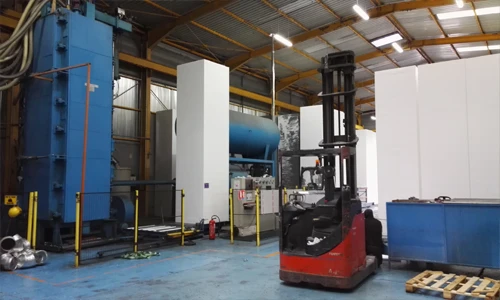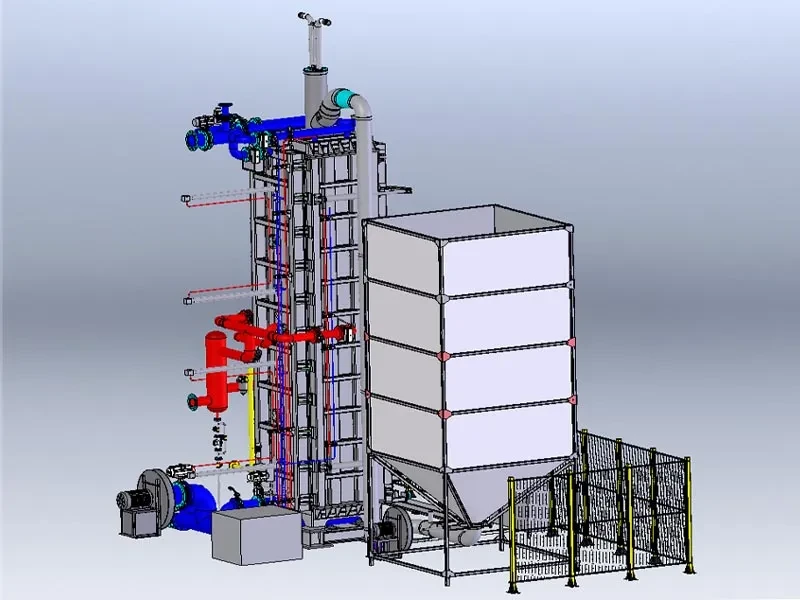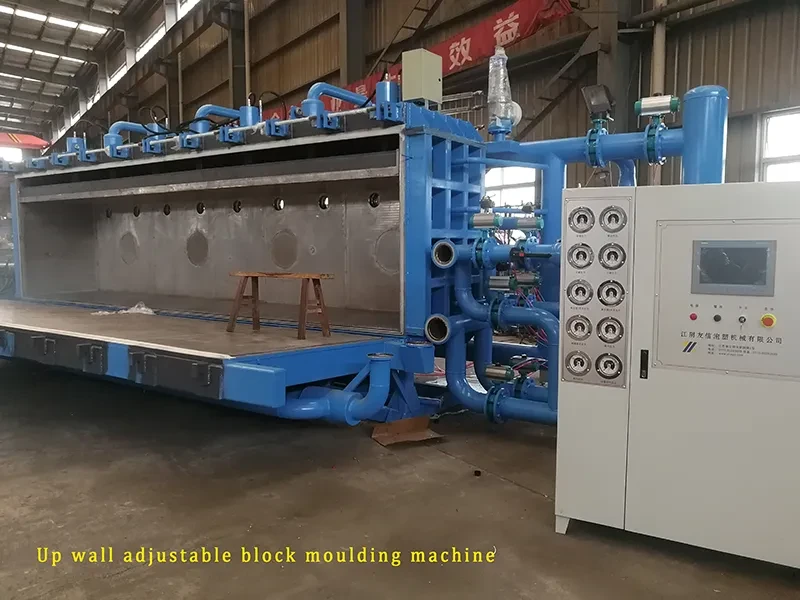Are you looking to streamline your EPS foam production? This article dives deep into the world of EPS block molding machines, exploring their functionalities, benefits, and how they can revolutionize your manufacturing process. Learn why investing in a high-quality block molding machine is crucial for businesses aiming for efficiency and superior product output in the expanded polystyrene industry.
What Exactly is EPS Block Molding and Why is it Important?
EPS block molding is a crucial manufacturing process for creating large foam blocks from expanded polystyrene (EPS) beads. These polystyrene blocks serve as the foundation for a wide range of applications, from insulation in the construction industry to protective packaging for delicate goods. The importance of block molding lies in its ability to efficiently produce consistent, high-quality eps blocks that meet specific size and density requirements. This process is essential for businesses involved in producing eps products for various sectors. The ability to create uniform foam structures is paramount for ensuring the performance and reliability of the final products.
Consider the construction industry, where eps blocks provide excellent thermal insulation. The consistency achieved through block molding ensures that the insulation performs optimally, contributing to energy efficiency in buildings. Similarly, in the packaging industry, precisely molded eps blocks offer superior protection during shipping and handling. Without reliable block molding, maintaining these standards would be challenging and costly.
What are the Key Components of an EPS Block Molding Machine?
An eps block molding machine, a piece of sophisticated machinery, comprises several essential components working in harmony. The mould, often referred to as a mold, is where the eps beads are expanded and fused into the desired block size. A robust steam system is critical for providing the heating necessary to expand and fuse the polystyrene beads. The vacuum system plays a vital role in removing air and moisture, ensuring uniform density and high-quality foam. A control panel, often equipped with a PLC (Programmable Logic Controller), allows operators to precisely manage the molding process involves, such as temperature, pressure, and cycle times. Additionally, a feeding system delivers the pre-expanded beads to the mould, and an ejection system removes the finished plastic products are automatically ejected.

Understanding these components is key to appreciating the complexity and precision involved in eps block molding. For instance, a high-quality steam valve and vacuum system are crucial for achieving the desired density and structural integrity of the foam blocks. The accuracy of the control panel directly impacts the consistency of the eps blocks produced. Investing in a block molding machine with reliable components translates to fewer production issues and a higher quality output.
How Does an EPS Block Moulding Machine Actually Work?
The operation of an eps block moulding machine is a fascinating blend of physics and engineering. The process involves several key stages. First, pre-expanded polystyrene beads are fed into the mould. Next, steam is injected into the cavity, causing the beads to further expand and fuse together. The steam valve controls the flow and pressure of the steam, crucial for achieving the desired density. A vacuum system then removes air and excess moisture, aiding in the consolidation of the foam. Cooling water is circulated through the mould to solidify the eps block. Finally, the mould opens, and the finished eps block is ejected.
This cycle, repeated continuously, allows for the efficient production of foam blocks. The precision of each step is vital. For example, the pre-expansion stage, often done using an eps pre-expander machine, significantly impacts the final density and quality of the block. Similarly, the cooling phase is critical to prevent deformation of the eps block. Modern eps block moulding machines often incorporate advanced control systems to optimize each stage of the block molding process, ensuring consistent and high-quality expanded polystyrene products.
What are the Different Types of EPS Block Molding Machines Available?
The world of eps block molding machines offers various configurations to suit different production needs. One primary distinction lies between vertical eps block moulding machines and horizontal block molding machines. Vertical machines are often favored for their compact footprint and ease of material loading, while horizontal machines can accommodate larger block sizes and offer easier access for maintenance. Another key difference lies in the level of automation. Manual machines require significant operator involvement, whereas automatic eps block moulding machines streamline the entire process, from filling the mould to ejecting the finished block. There are also mould adjustable machines, offering flexibility in producing eps blocks of varying dimensions.

Choosing the right type depends on factors like production volume, available space, and desired automation level. For businesses requiring high output and minimal manual intervention, an automatic horizontal block molding machine might be ideal. Companies with limited space might opt for a vertical machine. The option of a mould adjustable machine provides added versatility for manufacturers producing eps blocks in different shapes and sizes. Understanding these distinctions is crucial for making an informed investment in your block making capabilities.
Why Choose a High-Quality EPS Block Molding Machine Manufacturer?
Selecting the right manufacturer for your eps block molding machine is a decision with long-term implications. A reputable manufacturer like us, based in China, offers numerous advantages. Firstly, high-quality machines are built with durable materials and superior craftsmanship, ensuring longevity and minimizing downtime. Secondly, experienced manufacturers provide robust after-sales service, including technical support and readily available spare parts. This is a key concern for customers like Mark Thompson in the USA. Furthermore, established manufacturers often incorporate the latest technological advancements, leading to more efficient and reliable machines.
Consider the benefits of working with a manufacturer that understands the nuances of eps foam production. We, as a factory specializing in eps and epp foam machinery manufacturing, have multiple production lines and export to countries like the USA and Europe. This experience translates to machines designed for optimal performance and high strength. While cost is a factor, prioritizing quality ensures a better return on investment in the long run. Dealing with a reliable manufacturer also mitigates the pain points associated with inefficient communication and delays.
Considering Automation: What are the Benefits of an Automatic EPS Block Moulding Machine?
Automation in eps block moulding machines brings a host of benefits, significantly enhancing production efficiency and reducing operational costs. Automatic machines minimize the need for manual labor, leading to lower labor expenses and reduced risk of human error. They offer consistent and precise control over the entire block molding process, ensuring uniform density and high-quality output. Features like automatic material feeding, steam control, and plastic products are automatically ejected streamline the production cycle, resulting in higher throughput.
For businesses like Mark Thompson’s, focused on cost-effective production, automation is a game-changer. While the initial investment might be higher, the long-term savings from reduced labor costs, minimized waste, and increased production capacity make automatic eps block moulding machines a smart choice. Furthermore, automation improves workplace safety by reducing the need for manual handling of heavy eps blocks. Investing in automation is a strategic move for eps foam manufacturers looking to optimize their operations and maintain a competitive edge. Consider integrating an automatic eps conveyor to further enhance your automated production line.
What Factors Should You Consider When Choosing an EPS Block Molding Machine?
Selecting the right eps block molding machine requires careful consideration of several key factors. Production capacity is paramount – determine the volume of eps blocks you need to produce to meet demand. Block size requirements will dictate the necessary mould dimensions. Assess the level of automation needed based on your budget and labor availability. Energy consumption is another crucial factor, as energy-efficient machines can significantly reduce operating costs. The machine’s footprint and available space in your facility are also important considerations.
Furthermore, evaluate the manufacturer‘s reputation, after-sales service, and the availability of spare parts. Look for certifications like CE marking to ensure compliance with safety standards. Consider the machine’s control system and user interface – a user-friendly interface can simplify operation and reduce training time. For instance, Mark Thompson would prioritize machine performance, reliability, and the availability of spare parts. By carefully evaluating these factors, you can make an informed decision and choose an eps block molding machine that aligns with your specific needs and budget.
How Can an EPS Block Machine Improve Your Production Efficiency?
Investing in an eps block machine directly translates to improved production efficiency in several ways. Automated features reduce cycle times and minimize manual handling, allowing for faster production runs. The precision of modern machines ensures consistent eps block quality, reducing waste and rework. Reliable machines minimize downtime, maximizing operational hours. The ability to produce large eps blocks efficiently caters to bulk orders and reduces the need for multiple molding cycles.
For companies focused on meeting demanding production schedules, a high-performing eps block machine is indispensable. The increased throughput allows businesses to fulfill orders faster and take on larger projects. Furthermore, energy-efficient machines contribute to cost savings and align with sustainability goals. By streamlining the block molding process, an eps block machine empowers manufacturers to optimize their resources, reduce costs, and enhance their overall productivity. Consider integrating an eps cutting machine into your workflow to further enhance efficiency by processing the large blocks into desired shapes and sizes.
Looking Towards the Future: What Innovations are Happening in EPS Block Molding Machinery?
The field of eps block molding machinery is constantly evolving, with ongoing innovations aimed at enhancing efficiency, precision, and sustainability. One key area of development is in more sophisticated control systems, incorporating advanced sensors and software for real-time monitoring and adjustments of the molding process. This leads to even greater consistency and reduced waste. Energy efficiency is another major focus, with manufacturers developing machines that consume less power and utilize more sustainable materials.

The integration of Industry 4.0 technologies, such as IoT (Internet of Things) and data analytics, is also gaining traction, allowing for predictive maintenance and optimized performance. Furthermore, there’s a growing emphasis on designing machines with greater flexibility and modularity, enabling manufacturers to adapt to changing product demands more easily. These advancements promise a future where eps block molding is even more efficient, sustainable, and responsive to the needs of the industry. Exploring options like an eps shape moulding machine showcases the versatility of modern machinery.
Ready to Invest? How to Find the Right Block Molding Machine for Your Needs?
Finding the right block molding machine requires a strategic approach. Start by clearly defining your production requirements, including the desired output volume, block sizes, and level of automation. Conduct thorough research on potential manufacturers, considering their experience, reputation, and customer testimonials. Attend industry exhibitions to see machines in action and speak directly with suppliers. Request detailed specifications and quotes from multiple vendors.
Don’t hesitate to ask questions about machine features, performance, after-sales service, and warranty. Consider visiting the manufacturer‘s facilities to assess their production capabilities firsthand. For potential customers like Mark Thompson, focusing on china eps manufacturers offering high-quality and cost-effective solutions is key. Remember, investing in a block molding machine is a significant decision, so take the time to do your due diligence and choose a supplier that can be a long-term partner in your success. Contact us today to discuss your specific requirements.
Key Takeaways:
- EPS block molding machines are essential for efficient and consistent production of foam blocks.
- Understanding the different types of machines and their components is crucial for making the right choice.
- Choosing a high-quality manufacturer ensures reliability and long-term support.
- Automation offers significant benefits in terms of efficiency and cost savings.
- Careful consideration of your production needs and thorough research are vital for finding the perfect machine.
By understanding the intricacies of eps block molding and the capabilities of modern block moulding machines, you can make informed decisions that will drive efficiency and success in your EPS manufacturing endeavors.
Post time: 12-31-2024





